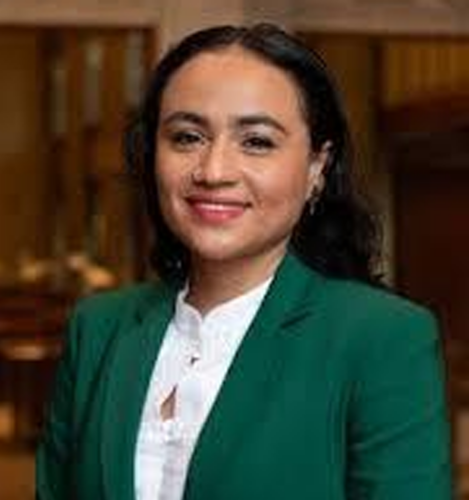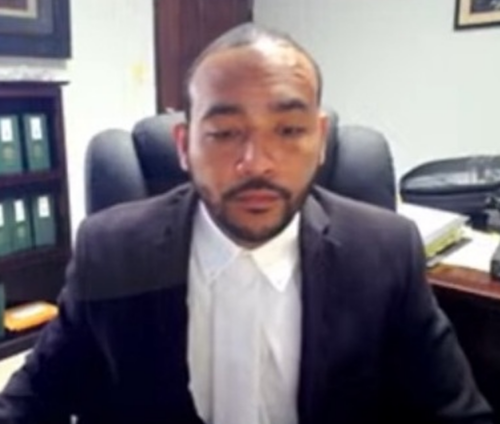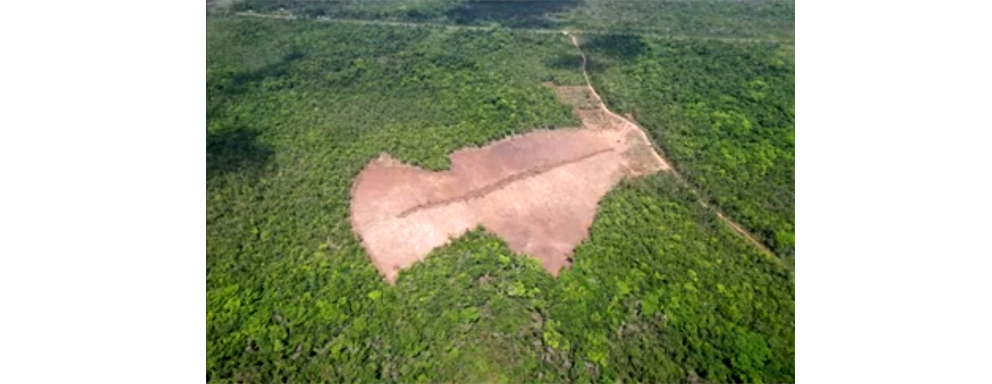CCJ monitors GoB’s compliance with Toledo Maya’s land rights Consent Order
by William Ysaguirre (Freelance Writer)
PORT OF SPAIN, Trinidad, Tues. Apr. 8, 2025
The Toledo Maya’ Consent Order on their traditional land rights handed down by the Caribbean Court of Justice on April 22, 2015, is fast approaching its 10th anniversary, but the Government of Belize has yet to present a draft policy on the implementation of the order. There are many knotty issues still to be worked out, including cases where the Toledo Maya have not given free and prior informed consent, which they have reported to the Inter-American Commission on Human Rights (IACHR). Their attorney, Leslie Mendez outlined these concerning matters in a virtual hearing with a panel of CCJ judges, which was live-streamed on Monday, April 7.

Toledo Maya attorney, Leslie Mendez
Attorney Mendez cited incidents of encroachment on Maya lands, land clearing, and registration of land interests which had ignored the CCJ order, without any investigation by local law enforcement agencies, in her arguments before Hon. Justice Winston Anderson, Hon. Madame Justice Maureen Rajnauth-Lee and Madame Justice Chantal Ononaiwu, with Nancy Bautista of the IACHR auditing the hearing as an observer. The Maya’s attorneys also include Allister Jenkins and Nigel Hughes of Guyana.
The Government of Belize had three deliverables for this hearing, which Justice Anderson outlined: a draft of the government’s policy on the Toledo Maya land rights, and to present a draft legislation which was to be delivered to the review committee by last Friday, April 4. These had been delayed by the March 12 elections, and the transfer of duties on these matters to new personnel in different departments, the government’s attorney – Senior Counsel Andrew Marshalleck explained. He therefore requested another 30-day extension for the policy to be presented to the sub-committee on the policy, before it goes to a legal draftsperson and a further 30 days extension, 60 days in total, before a working draft legislation is presented to Cabinet, prior to it being presented in the House of Representatives.

Toledo Maya attorney, Allister Jenkins
The IACHR reported that they had received complaints on February 27 of encroachment in Golden Stream Village, which began last December 29. The encroachment involved land clearing and destruction of property by third parties, affecting 7,000 acres of land near Golden Stream. This was the second complaint the Commission had received regarding Golden Stream, as they had first visited the village to investigate first-hand on June 18, 2020, when they received complaints of a license being granted for salvage logging along the Golden Stream river.
The Commission called on the Government to urgently investigate whether any title or licenses had been issued, as the villagers complained, and the Commission also queried whether the Government has communicated to these third parties the existence of the Toledo Maya’ land rights, as defined by the CCJ order, as it should not be left to third parties to decide whether they choose to honor the CCJ’s “free and prior informed consent” order. Bautista requested that the government investigate the matter urgently and report to the Commission within two weeks, or the Commission would have to issue a statement on the issue.
There had been a 100-acre tract of land cleared, Marshalleck admitted, but there has been no ongoing training of Government personnel on compliance with the CCJ order in the last 30 days, as many public servants have been in transition in the wake of the general elections, he explained
Mendez argued that that was no excuse, and that the matter was not being treated with any urgency. The third parties have continued land clearing, without any regard for Paragraph 4 of the CCJ order; there has been no process of free and prior informed consent, nor consultation on the ground with the Golden Stream villagers, she stated. She said the government has not investigated or intervened, and made no attempt to engage with the Toledo Maya, which she found completely unacceptable. The Office for Indigenous Peoples Affairs may be in transition; but even so, they do not have any powers of enforcement, such as the Police and Lands Department have. The objective of the CCJ order was protection of the Maya’s land, but in the meantime there has been irreparable damage to property. Mendez presented aerial photographs of the affected area, for what appeared to be land clearing to facilitate “plane landings”.
There is no contact point for the government to investigate the Golden Stream matter, Marshalleck disclaimed, as there have been no applications to the government for permits. The law enforcement agencies – the Police and Department of Environment would need to receive a report before they can act.
The Golden Stream Maya had appealed to the Police, Mendez countered; but she said the Police had only responded to complaints from the purported land owner, who complained of being harassed by the Mayan villagers. When the private owner declared that he would proceed with land clearing, the Police did nothing.
Marshalleck admitted that the government would need to instruct the Police as to how they would enforce the law, as he believed there was a certain minimal area that a land owner may clear without requiring any permits from DOE. He argued that the private land owner was simply developing land to which he had held title from before the CCJ order was issued.
Mendez also presented a series of maps showing the traditional land boundaries which 33 Toledo villages have defined as their traditional land, pointing out that there were some boundaries that had yet to be harmonized between neighboring villages, where the boundary was in dispute. She noted that there are seven villages which had not yet participated in the exercise.
She also presented a map showing the government’s proposal for the villagers’ land to be limited to a 1-km, 2-km or 3-kilometer radius around the village, which was incongruous with the village boundaries that the Toledo Maya had demarcated. The government’s proposal was suggesting to limit the Maya rights to land they might need, where Mendez argued that this bears no resemblance to the lands that they have used and occupied. The government has also set a 30-year threshold for the Maya to prove that they have used and occupied said lands for at least 30 years. This seems to be a deliberate attempt to limit the Maya’s rights to their land, Mendez argued, as this condition completely excluded two villages which did not exist until 25-26 years ago!
Justice Anderson concluded the hearing by ordering the government to present its compliance reports and draft policy by July 11 to be reviewed at the next monitoring hearing on July 25, as he did not wish to delay the process and hoped to have something tangible by October.

